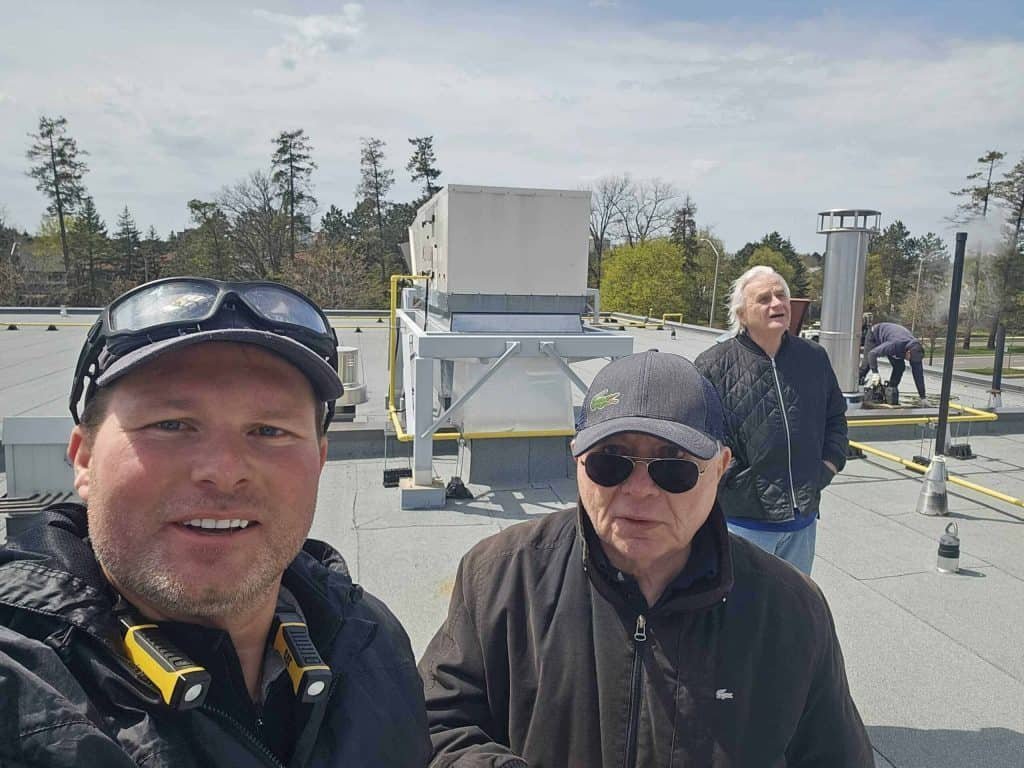Ensuring optimal working conditions within commercial spaces goes beyond mere comfort—it’s about creating environments that boost productivity and well-being. Commercial HVAC systems play a crucial role in achieving this balance, seamlessly integrating efficiency with comfort. From precise temperature control to advanced air quality management, these solutions are tailored to meet the unique demands of large-scale operations. By prioritizing energy efficiency and performance, businesses not only enhance employee satisfaction but also reduce operational costs. Discover how investing in tailored HVAC solutions can transform your workspace into a haven of productivity and comfort, ensuring a conducive atmosphere for success.
Understanding the Role of HVAC Systems in Commercial Spaces

HVAC systems in commercial spaces play a pivotal role in creating comfortable and conducive environments for occupants. Beyond maintaining optimal temperature levels, these systems regulate humidity and ensure adequate ventilation, which are crucial for occupant health and productivity. By effectively circulating air and controlling indoor conditions, HVAC systems create a stable and comfortable atmosphere year-round, regardless of external weather conditions.
This capability not only enhances employee satisfaction and performance but also supports the operational needs of businesses by providing a consistent environment for processes and equipment. Understanding these roles helps businesses appreciate the holistic impact of HVAC systems on their operations and underscores the importance of investing in quality systems tailored to their specific needs.
Key Factors Impacting HVAC Efficiency
HVAC efficiency hinges on several critical factors that collectively determine the system’s performance and operational costs. Proper system design, including sizing and layout, ensures optimal airflow and distribution throughout the building. Quality installation by trained professionals minimizes energy waste and ensures all components function at peak efficiency. Regular maintenance, including cleaning filters and inspecting ductwork, prevents system inefficiencies and potential breakdowns.
Additionally, technological advancements in HVAC equipment, such as variable-speed motors and programmable thermostats, contribute to enhanced efficiency by adapting operations to real-time conditions and occupancy levels. Understanding and addressing these factors not only improve energy efficiency but also extend the lifespan of HVAC systems, reduce environmental impact, and lower overall operational costs for businesses. By prioritizing these considerations, businesses can optimize their HVAC investments and reap long-term benefits.
Choosing the Right HVAC System for Your Business Needs
Selecting the right HVAC system involves a comprehensive assessment of various factors tailored to the specific needs of the business and its operational environment. Factors such as building size, layout, occupancy patterns, and local climate conditions all influence the selection process. Businesses must consider energy efficiency ratings (SEER, EER), system capacity, zoning capabilities, and compatibility with existing infrastructure when choosing HVAC equipment.
Additionally, budget constraints, maintenance requirements, and potential incentives or rebates for energy-efficient systems play a significant role in the decision-making process. By conducting a thorough evaluation and consulting with HVAC professionals, businesses can identify a system that not only meets immediate needs but also supports long-term operational goals. Choosing the right HVAC system ensures optimal performance, energy savings, and comfort for building occupants, enhancing overall productivity and satisfaction within the workplace.
Integrating Smart Controls for Optimal Performance
In today’s technologically advanced landscape, integrating smart controls into HVAC systems offers businesses unparalleled opportunities to optimize performance and efficiency. These innovative solutions enable real-time monitoring, remote management, and automated adjustments, ensuring precise climate control and energy savings.
- Real-time Monitoring: Smart controls provide instant insights into HVAC system performance, allowing proactive maintenance and troubleshooting.
- Remote Management: Adjust temperature settings and monitor energy usage remotely, enhancing operational efficiency and convenience.
- Automated Adjustments: Smart sensors and algorithms adjust HVAC operations based on occupancy and environmental conditions, maximizing comfort and energy efficiency.
- Energy Usage Insights: Detailed energy usage data helps identify opportunities for further optimization and cost savings.
- Integration with Building Systems: Seamless integration with other building automation systems enhances overall efficiency and operational synergy.
By integrating smart controls, businesses not only enhance operational efficiency but also achieve significant cost savings and environmental benefits. These technologies empower proactive management and optimization of HVAC systems, ensuring comfort, sustainability, and long-term operational excellence.
Cost-Effective Strategies for HVAC Upgrades
Implementing cost-effective strategies for HVAC upgrades allows businesses to improve efficiency, reduce operational costs, and enhance occupant comfort without compromising on quality or performance.
- Energy Audits: Conduct comprehensive energy audits to identify inefficiencies and prioritize upgrade opportunities.
- Efficient Equipment Selection: Choose energy-efficient HVAC equipment with high SEER/EER ratings to maximize savings and performance.
- Maintenance Plans: Establish regular maintenance schedules to optimize system efficiency and prevent costly repairs.
- Incentive Programs: Take advantage of local utility incentives, rebates, or tax credits for installing energy-efficient HVAC systems.
- Life Cycle Cost Analysis: Consider long-term savings and benefits when evaluating upfront costs versus operational savings.
By strategically planning HVAC upgrades, businesses can achieve significant cost savings, improve system performance, and create a more comfortable and sustainable environment for occupants. These investments not only enhance operational efficiency but also contribute to overall business profitability and environmental responsibility.
Benefits of Energy-Efficient HVAC Solutions

Energy-efficient HVAC solutions offer numerous benefits to commercial businesses beyond just reducing energy consumption. These systems lower operational costs by decreasing utility bills through improved efficiency in heating, cooling, and ventilation. Moreover, they contribute to sustainability efforts by reducing greenhouse gas emissions and overall environmental impact. Many energy-efficient HVAC systems qualify for incentives, tax credits, or rebates from local utilities or government programs, providing additional financial benefits for businesses.
Enhanced system reliability and reduced maintenance needs further contribute to cost savings over the system’s lifespan. By investing in energy-efficient HVAC solutions, businesses not only improve their bottom line but also demonstrate corporate responsibility and commitment to environmental stewardship. These systems create healthier and more comfortable indoor environments for occupants, fostering productivity and satisfaction while aligning with sustainable business practices.
Enhancing Indoor Air Quality with Advanced HVAC Technology
Advanced HVAC technologies play a crucial role in enhancing indoor air quality (IAQ) by effectively managing airborne pollutants, allergens, and pathogens within commercial spaces. High-efficiency air filtration systems capture and remove particles, including dust, pollen, and bacteria, improving respiratory health and reducing allergy symptoms among occupants. UV germicidal irradiation systems deactivate harmful microorganisms, such as viruses and mold spores, circulating in the air, further enhancing IAQ and preventing the spread of illnesses.
Proper ventilation systems ensure adequate fresh air intake while expelling stale air, maintaining optimal humidity levels and reducing the buildup of indoor pollutants. By integrating these technologies, businesses not only create healthier indoor environments but also boost employee productivity and satisfaction. Enhanced IAQ supports overall well-being, reduces absenteeism due to illness, and promotes a more comfortable and inviting workspace for all occupants.
Maintenance Strategies to Extend HVAC Lifespan
Implementing effective maintenance strategies is crucial for prolonging the lifespan and maximizing the efficiency of commercial HVAC systems. Regular inspections and preventive maintenance tasks, such as cleaning or replacing air filters, checking refrigerant levels, and inspecting ductwork for leaks, ensure the system operates at peak performance. Addressing minor issues promptly prevents them from escalating into major and costly repairs, minimizing downtime and disruption to business operations.
Scheduled maintenance also includes lubricating moving parts, calibrating controls, and testing system components to optimize efficiency and reliability. Professional HVAC technicians can provide comprehensive maintenance plans tailored to the specific needs of the system and building, ensuring compliance with manufacturer warranties and industry standards. By prioritizing regular maintenance, businesses not only extend the lifespan of their HVAC investments but also reduce energy consumption, improve indoor comfort, and lower overall operating costs over time.
Conclusion
Investing in tailored commercial HVAC solutions is pivotal for businesses aiming to maximize efficiency and comfort within their operational spaces. From understanding the critical role of HVAC systems to selecting energy-efficient options and integrating advanced technologies for optimal performance and indoor air quality, each decision contributes significantly to overall productivity and employee satisfaction. Regular maintenance and smart controls further enhance system reliability and cost-effectiveness, ensuring long-term benefits for business operations. By prioritizing these aspects, businesses not only create a more comfortable and conducive working environment but also demonstrate their commitment to sustainability and operational excellence.
For expert advice on optimizing your commercial HVAC system, contact Air Repair at 19 Maple Grove Ave, Richmond Hill, Ontario, Canada. Reach us at (647) 330-2979 to discuss your HVAC needs and schedule a consultation today. Discover how Air Repair can tailor solutions to enhance your business environment and operational efficiency.


